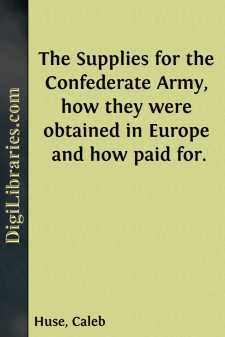History
- Africa 30
- Americas (North Central South West Indies) 50
- Ancient 68
- Asia 58
- Australia & New Zealand 8
- Canada 41
- Caribbean & West Indies 1
- Civilization 20
- Eastern Europe 12
- Europe 310
- Expeditions & Discoveries 60
- General 77
- Historical Geography 1
- Jewish 9
- Latin America 3
- Medieval 8
- Middle East 13
- Military 248
- Revolutionary 8
- Study & Teaching 5
- United States 353
- Western Europe 56
- World 13
History Books
Sort by:
PREFACE I have often been asked to write my life, as those who know me know that it has been an eventful one. At last I have acceded to the importunities of my friends, and have hastily sketched some of the striking incidents that go to make up my history. My life, so full of romance, may sound like a dream to the matter-of-fact reader, nevertheless everything I have written is strictly true; much has...
more...
by:
Caleb Huse
REMINISCENCES my return in May, 1860, from a six months' leave of absence spent in Europe, I found an appointment as professor of chemistry and commandant of cadets in the University of Alabama awaiting my acceptance. During my absence the President of the University and a committee of the Board of Trustees visited West Point and the Virginia Military Institute and, pleased with the discipline of...
more...
by:
Thomas Hodson
Preface. I can now, in my mind’s eye, see Chickka, the washerman, as if I had met him yesterday; and I can see the mud houses of Singonahully, the mud wall of the village, and the temple of Runga, as if they were all before me. Yet five and thirty years are passed and gone since the afternoon when, in quest of medical aid, I rode past the village, hoping yet to see it the abode of many follower’s...
more...
A WALK ROUND MELBOURNE. Although most educated people know that Melbourne, Sydney, and Adelaide are populous towns, I should doubt whether one Englishman, who has not been to Australia, out of a hundred realizes that fact. I well remember that, although I had taken some trouble to read up information about Melbourne, I was never more thoroughly surprised than during the first few hours after my arrival...
more...
by:
A. K. Browne
THE STORY. On Sunday, June 12th, 1864, the U. S. Steamer Kearsarge was lying at anchor in the Scheldt, off Flushing, Holland. Suddenly appeared the cornet at the fore—an unexpected signal, that compelled absent officers and men to repair on board. Steam was raised, and immediately after a departure made, when all hands being called, the nature of the precipitate movement became apparent. Captain...
more...
CHAPTER I EVENTS LEADING UP TO THE SIEGE OF LADYSMITH 1899 On returning from the North-West Frontier of India at the close of the Tirah Expedition, 1897-8, the 1st Battalion Devonshire Regiment, which had served with distinction under the command of Colonel J.H. Yule in the campaign against the Afridi clans, was ordered to proceed from Peshawar to Jullunder, at which place it was quartered in 1898 and...
more...
by:
Hilda T. Skae
CHAPTER I There was a time, many years ago, when this England of ours was a savage country. The oldest stories that we read about our island happened so long ago, that the English had not yet come to the land where we live. In those days, the country was not called England but Britain; and the people were the ancient Britons. In the time of the Britons, the greater part of the country was covered with...
more...
Five centuries of isolation succeed. In the Netherlands, as throughout Europe, a thousand obscure and slender rills are slowly preparing the great stream of universal culture. Five dismal centuries of feudalism: during which period there is little talk of human right, little obedience to divine reason. Rights there are none, only forces; and, in brief, three great forces, gradually arising, developing...
more...
My Lords, Pursuant to your lordships order of the 25th May 1770, we have taken into our consideration the humble memorial of the honourable Thomas Walpole, Benjamin Franklin, John Sargent, and Samuel Wharton, Esquires, in behalf of themselves and their associates, setting forth (among other things) "That they presented a petition to his Majesty, in council, for a grant of lands in America (parcel...
more...
THE TRAIL The trail is narrow—often but the width of the pony's feet, a tiny path that leads on and on. It is always ahead, sometimes bold and wide, as when it leads the way through the forest; often narrow, as when it hugs the sides of the precipice; sometimes even hiding for a time in river bottom or swamp, or covered by the débris of last winter's avalanche. Sometimes it picks its...
more...











